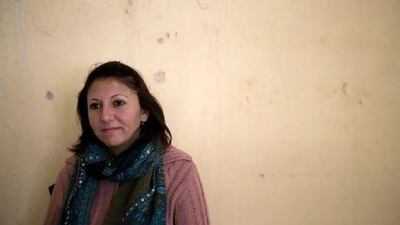DAMASCUS // Efforts by the Syrian authorities to quell an uprising in Deraa led to the sacking of the provincial governor yesterday, a step that meets one of the protesters' demands.
Despite that, unprecedented demonstrations continued, amid signs of public dissent spreading.
No announcement on the sacking was made, but anonymous Syrian officials were quoted by news outlets as confirming that Faisal Kalthoum was stripped yesterday of his governorship of Deraa, 100km south of Damascus.
There were also unconfirmed reports that senior local security officials, reviled by the city's residents, had been reassigned. A Baath party member from Deraa told The National that local heads of security had been "suspended".
The governor's apparent removal is the authorities' second concession to protesters since the uprising in Deraa began on Friday.
Fifteen schoolchildren who were arrested earlier this month for writing protest slogans on a wall were released on Sunday, meeting another of the protesters' demands.
A heavy police presence remained in Deraa yesterday, according to civil society activists, while hundreds of demonstrators gathered once again in the streets, chanting slogans calling for freedom.
"The situation is still tense, but there has been no new violence or problems," one activist said.
SANA, the state run news agency, reported that "normal life prevailed" across the governorate, with shops and government offices once again open for business. Deraa is the provincial capital.
In an outbreak of unprecedented public rebellion, thousands of demonstrators have clashed with security forces in the city since Friday. At the height of the unrest, riot police armed with assault rifles used tear gas and live ammunition against the crowds.
Six civilians were killed, including one 11 year-old boy.
The UN human rights office yesterday urged Syria to carry out an "independent, transparent and effective" investigation into the deaths. The Syrian government has launched an inquiry into the killings, promising those responsible would be held to account.
Those shootings stoked protesters anger and, on Sunday night, crowds in Deraa set fire to the courthouse, the ruling Baath party headquarters, and two branch offices of Syria's mobile phone operators - seen as symbols of corruption, nepotism and inequality.
Among a list of demands, the protesters called for the governor, in place since 2006, to be sacked and for the secret police apparatus to be dismantled, accusing them of heavy-handedness and graft.
While some of the demands have now been met, major points that go beyond local concern and involve controversial national issues, remain unresolved and continue to fuel protests elsewhere.
On Monday, some 200 people staged a demonstration in Hajar Aswad, a poor neighbourhood of Damascus, 6km from the city centre. Most residents are refugees from the Golan Heights, displaced by wars with Israel and unable to return to their homes.
"There was a large crowd, most of the protesters were displaced people from the Golan but there were also some new faces," a resident told The National, on condition of anonymity. "They marched and shouted in support of the protests in Deraa, they also shouted 'God, Syria, Freedom'."
That chant has been echoed in smaller protests across the country since first being heard at a brief demonstration in Damascus Old City, on 15 March.
According to the Hajar Aswad resident, riot police dispersed the marchers, arresting between 10 and 15 people.
Protests were also reported in Madaya, Saida Zeynab and Dumma, suburbs of the Syrian capital. Al Watan, a privately owned Syrian newspaper with close links to the government, referred to "small demonstrations" in those areas.
Protesters in Deraa and elsewhere have called for all political prisoners to be released and repressive emergency laws scrapped.
Syria has been ruled under martial law for 48 years, giving the authorities and security forces sweeping powers of arrest and detention, justified on the grounds that the country is at war with Israel.
Critics say the emergency laws are simply used for jailing the government's political opponents.
There are believed to be between 3,000 and 4,000 political prisoners in Syria, some of whom are on hunger strike. Ten women detained at a demonstration outside the interior ministry in Damascus last Wednesday are refusing food. One, Hervene Oce, a Kurdish activist, is also refusing water, and her health has "seriously deteriorated", according to Abdul Karim Rehawi, head of the Syrian League for Human Rights.
The unrest marks the most serious challenge to the leadership of Bashar al Assad, the Syrian president, since he inherited power from his father 11 years ago.

